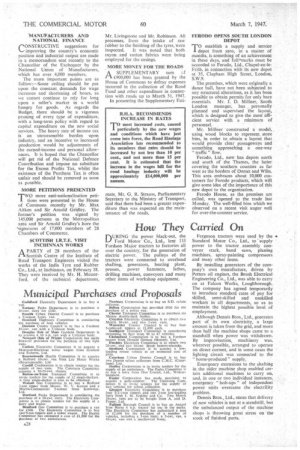How They
Page 30

If you've noticed an error in this article please click here to report it so we can fix it.
Carried On nURING the power black-out, the
Ford Motor Co., Ltd., lent 135 Fordson Major tractors to factories all over the country, for the generation of electric power. The pulleys of the tractors were connected to overhead shafting, generators, heating plant, presses, power hammers, lathes, drilling machines, conveyors and many other items of workshop equipment.
Ferguson tractors were used by the • Standard Motor Co., Ltd„ to supply power to the tractor, assembly conveyor track, band saws, planing machines, spray-painting compressors and many other items.
By installing generators of the company's own manufacture, driven by Petters oil engines, the Brush Electrical Engineering Co., Ltd., was able to carry on at Falcon Works, Loughborough. The company has agreed temporarily to introduce standard rates of pay for skilled, semi-skilled and unskilled workers in all departments, so as to maintain the highest possible level of employment.
Although Dennis Bros„-Ltd., generates part of its own electricity, a large amountis taken from the grid, and more than half the machine shops came to a standstill when power was Isithdrawn. By improvisation, machinery was, wherever possible, arranged to operate on direct current, and in some cases the lighting circuit was connected to the "
home-produced" supply, Emergency extensions to the shafting in the older machine shop enabled certain additional machines to carry on, and, in one or two individual instances. emergency "lash-ups" of independent power units overcame the electribity problem.
Dennis Bros., Ltd., states that delivery of new vehicles is not at a standstill, but the unbalanced output of the machine shops is throwing great stress on the stock of finished parts,












































































